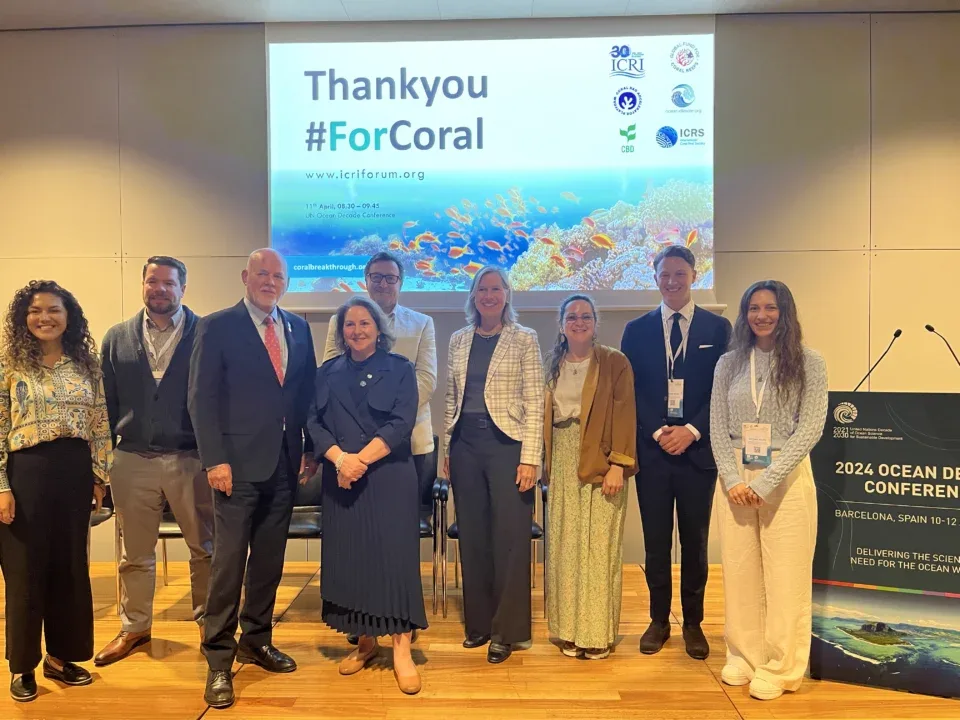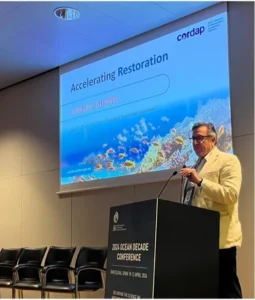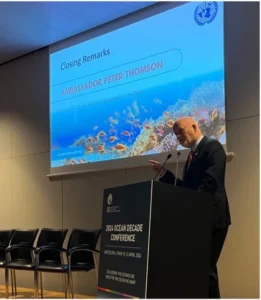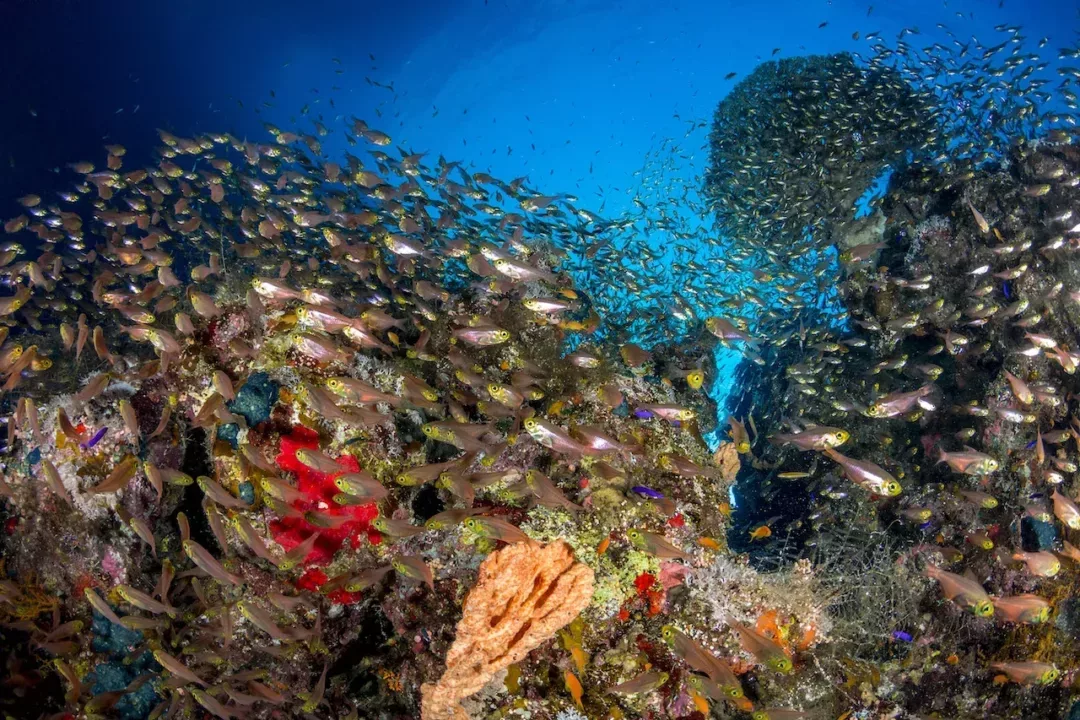Three years after the start of the UN Decade of Ocean Science for Sustainable Development (2021-2030), a global conference brought together the Ocean Decade community and partners to celebrate achievements and set joint priorities for the future of the Decade. Hosted by Spain and co-organized with UNESCO’s Intergovernmental Oceanographic Commission (IOC/UNESCO), the 2024 UN Ocean Decade Conference took place on 10-12 April 2024 in the coastal city of Barcelona.
During the conference, representatives from governments, universities, the private sector, non-governmental organisation (NGO’s) and other stakeholders, focused on ‘delivering the science we need for the ocean we want’, and reflected on the current progress made and set a collective vision and joint priorities for the rest of the Decade. Throughout the conference a variety of on-site and off-site satellite events were held to supplement the main programme by providing additional forums for discussion, networking and knowledge sharing.

Healthy, thriving, and resilient coral reefs are essential for a healthy planet. Coral reefs are depended upon by one billion people and provide services valued at up to $9.9 trillion each year. They provide coastal protection, recreation and tourism, sources of animal protein, and fisheries, supporting livelihoods and hold strong cultural and traditional values. Yet, despite this immense value to people, and nature, coral reefs continue to face mounting threats.
 At the time of the event, the world was on the cusp of its 4th global mass coral bleaching event, which has now been confirmed by the National Oceanic and Atmospheric Administration (NOAA) and the International Coral Reef Initiative (ICRI). It is now, more than ever, important to highlight solutions to conserve, protect and restore coral reefs, promote resilience, and support the local communities who depend on them.
At the time of the event, the world was on the cusp of its 4th global mass coral bleaching event, which has now been confirmed by the National Oceanic and Atmospheric Administration (NOAA) and the International Coral Reef Initiative (ICRI). It is now, more than ever, important to highlight solutions to conserve, protect and restore coral reefs, promote resilience, and support the local communities who depend on them.
On Thursday 11th April 2024, ICRI led a satellite event, “The Coral Reef Breakthrough”, in collaboration with the G20 Coral Research & Development Accelerator Platform (CORDAP), the Convention on Biological Diversity (CBD), the Global Fund for Coral Reefs (GFCR), the International Coral Reef Society (ICRS) and the Ocean and Climate Platform (OCP). The Coral Reef Breakthrough aims to secure the future of at least 125,000 km2 of shallow-water tropical coral reefs with investments of at least US$12 billion to support the resilience of more than half a billion people globally by 2030. Achieving the Coral Reef Breakthrough means preventing the functional extinction of one of the world’s most threatened, yet most valuable, and most biodiverse, ecosystems.
 The event was moderated by Tom Dallison (ICRI Secretariat) and started with an emotive video as part of ICRI’s ‘Ask the Expert’ Series – What if Coral Reefs Disappeared in 2050?. Opening remarks from Nicole LeBeouf (NOAA) began with a powerful message: “Hope is a verb with its shirtsleeves rolled up,” igniting action in the face of coral reef decline. Loreley Picourt (OCP) set the context of the event under the Ocean Breakthrough, while Margaux Monfared (ICRI Secretariat) outlined the Coral Reef Breakthrough’s global targets #ForCoral. Next, Joseph Appiott, (Secretariat of the CBD) emphasised the Breakthrough’s role in the implementation of the Global Biodiversity Framework. Action point three and four of the Coral Reef breakthrough were then presented, and solutions of coral reef restoration, were discussed by Carlos Duarte (CORDAP), and investment mobilisation, was highlighted by Susan Gardner (UNEP/GFCR). Mariana Rocha de Souza, (ICRS) stressed the UN Ocean Decade’s significance for coral conservation with Ambassador Peter Thomson, United Nations Secretary General’s Special Envoy for the ocean, calling on Nations, organisations and Ocean practitioners to endorse and implement the Breakthrough.
The event was moderated by Tom Dallison (ICRI Secretariat) and started with an emotive video as part of ICRI’s ‘Ask the Expert’ Series – What if Coral Reefs Disappeared in 2050?. Opening remarks from Nicole LeBeouf (NOAA) began with a powerful message: “Hope is a verb with its shirtsleeves rolled up,” igniting action in the face of coral reef decline. Loreley Picourt (OCP) set the context of the event under the Ocean Breakthrough, while Margaux Monfared (ICRI Secretariat) outlined the Coral Reef Breakthrough’s global targets #ForCoral. Next, Joseph Appiott, (Secretariat of the CBD) emphasised the Breakthrough’s role in the implementation of the Global Biodiversity Framework. Action point three and four of the Coral Reef breakthrough were then presented, and solutions of coral reef restoration, were discussed by Carlos Duarte (CORDAP), and investment mobilisation, was highlighted by Susan Gardner (UNEP/GFCR). Mariana Rocha de Souza, (ICRS) stressed the UN Ocean Decade’s significance for coral conservation with Ambassador Peter Thomson, United Nations Secretary General’s Special Envoy for the ocean, calling on Nations, organisations and Ocean practitioners to endorse and implement the Breakthrough.
Amidst the mounting challenges and pressure faced by coral reefs, the event exemplified that there is hope and there are solutions. By raising awareness, advocating for sustainable practices, and supporting initiatives to protect and restore coral reefs, we can ensure that these invaluable ecosystems thrive for generations to come.

